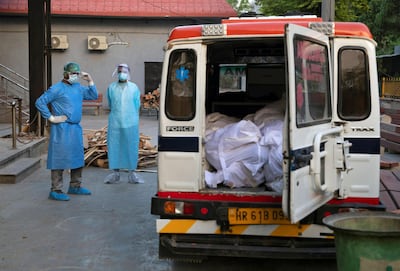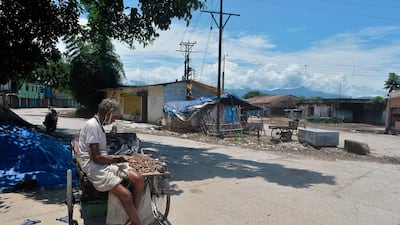A week after India lifted its crippling nationwide lockdown for businesses and places of worship, many big cities still appear like ghost towns as panic grips millions of residents over soaring coronavirus cases.
Last Monday, the Indian government allowed markets, shopping malls and restaurants across the country to open after 75 days of lockdown that hammered the country's business community and flagged the economy alike.
But the relief has done little for tens of thousands of businesses across major cities, which are bearing the brunt of the pandemic. Total cases have risen to nearly 350,000 and deaths have passed 10,000 in the world's second most populous country.
Almost half of the country's Covid-19 cases were concentrated in major cities, where millions live in packed neighbourhoods amid fears that the country could be further battered by the outbreak in coming weeks.
However, the rising cases and mass psychosis is playing havoc with the business community that was seeking reprieve from the harsh lockdown.
Connaught Place, the British-era main commercial hub in New Delhi wore a deserted look as shops and businesses remained closed even after a week of relaxation, with only a few citizens braving to venture out.

Delhi has more than 41,000 cases and authorities have warned half-a-million residents will get infected by the end of July, overwhelming the city's healthcare system that has already witnessed patients being fatally turned away for want of space.
Most establishments, restaurants and coffee shops remained closed across many commercial districts, locations that are usually crowded by shoppers and visitors.
Delhi metro system that carries 1.5 million passengers every day remains suspended, making commuting difficult for a vast population.
"Number of cases are multiplying everyday...there is no way I will go to a shopping mall or markets. There is always a fear of contracting infection, who knows who is infected," Nikita Chaudhary, a regular shopper, told The National.
A survey by LocalCircles, an online community-based social media network, found that 56 per cent of Indians are currently feeling anxious about going out.
Sujata Bhatt, 32, a makeup consultant at a famous cosmetic store at a major market in Noida near Delhi, was thrilled to be back to work after three months on June 8.
But she has been dejected by the footfall.
“It has been a week since we opened the store but we get only two to three customers from an average of 30 customers before the pandemic,” Ms Bhatt said.
Trade unions describe the situation as "scary" for their businesses as commercial activity has failed to kick-start in the wake of the panic that has gripped the people.
“There is only a 5-7 per cent footfall," said Praveen Khandelwal, secretary general of the Confederation of All India Traders.
“Traders are highly shaken…they are not able to revive their activities for want of finances. There are hardly any customers but we have to still pay taxes and employees’ salaries,” added Mr Khandelwal.
The story was no different in other big cities, where life and business remained disrupted over fears of flare-up.
Authorities in southern Tamil Nadu said they will re-impose "maximised restricted lockdown” for the rest of the month in four cities of the state, including capital Chennai after infection cases crossed 45,000.
Even Mumbai, India's financial capital has struggled with the rising caseload that has surpassed China's Wuhan city where the virus was first reported in December 2019.
The city had more than 60,000 cases and over 2,000 deaths, making it the worst region for the pandemic in India as authorities maintain that the country has managed the outbreak successfully.
Prime Minister Narendra Modi's government has sought public cooperation in dealing with the crises, asking people to learn to live with the virus. Social distancing and masks have been made mandatory in public places and people are encouraged to wash their hands or use sanitisers regularly.
The government has allowed religious congregations, mainly to boost public confidence but not many were ready to take refuge in faith.
Since Monday, Delhi's Sikh temple Bangla Sahib had a footfall of a few hundred pilgrims compared to more than 75,000 a day.
Last week, Delhi Jama Masjid closed down for the rest of the month over fears that gatherings could worsen the situation.
Two major temples in southern Kerala - Sabarimala and Tirumala - have either cancelled gatherings or scaled down the number of devotees as fear takes over faith.
"I don't want to risk my life by going out to a mall or a temple and getting infected when there is no guarantee of treatment," Teesha Rathi, a make-up artist, told The National.
Health experts say the public anxiety was not unfounded as Covid-19 cases were going up manifold amid regular stories of emotional trauma and loss caused by the pandemic, a global event full of uncertainty and no cure.
"Fear psychosis is there but it is realistic and not imaginary," Dr Pulkit Sharma, psychologist at Vimhans, a Delhi-based neurosciences hospital, told The National.
“If you get sick what treatment will be available? People who can manage to stay home, think everything can wait, hotels, malls can wait, and are staying in.”
_______________











